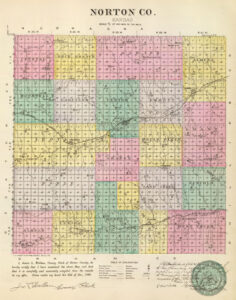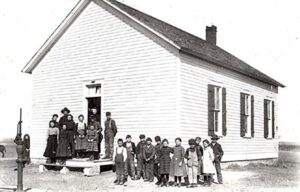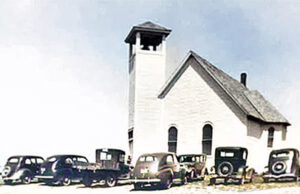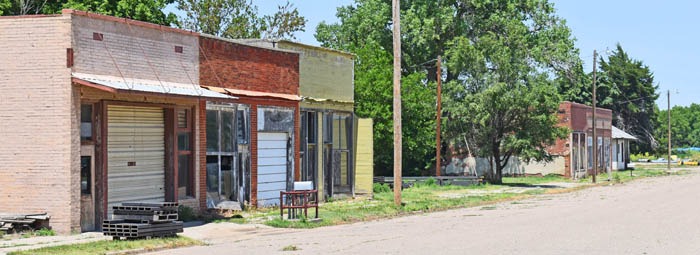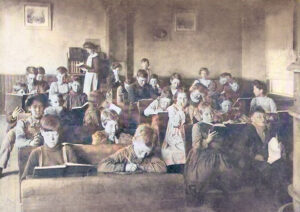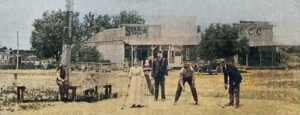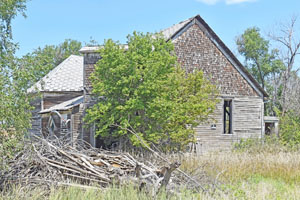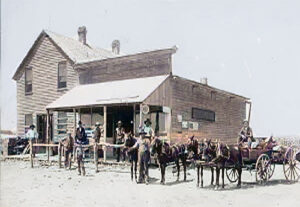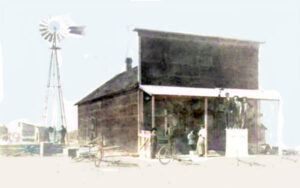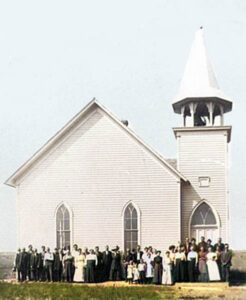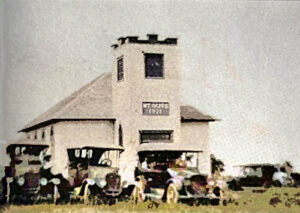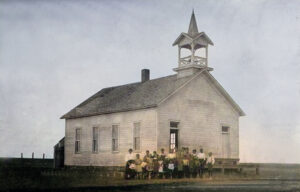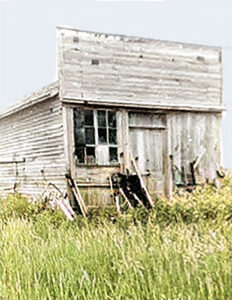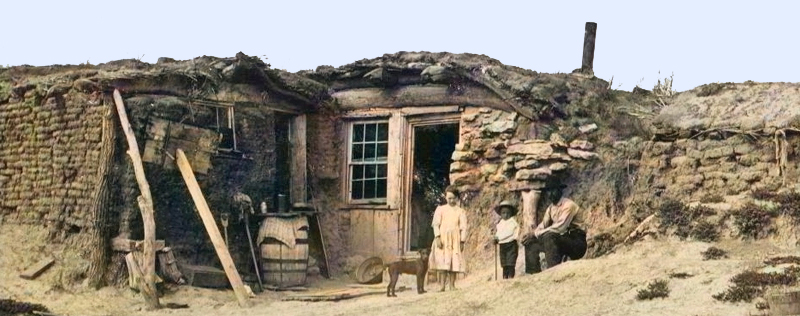
An old dug-out home in Norton County, Kansas, about 1885.
| Town | Post Office Dates | Additional Information |
| Ailanthus Grove | 1879 | The post office was only open for about five months. |
| Alfalfa | 1882 | The post office was only open for about three months. |
| Alverd | 1900 | The post office was open for about nine months. |
| Baker | None |
In the late 1870s, a group of homesteaders from the Evangelical Association in Wisconsin got together. They wrote the Evangelical headquarters in Kansas, and the Association sent traveling ministers. They met in a schoolhouse, which Herman Roeder had provided the land for, three and one-half miles south of Almena. While Reverend Trauger was minister, he noted that a Methodist congregation that worshipped in the Buffalo schoolhouse had no minister. Under his guidance, he brought the two groups together. In the summer of 1913, they moved to the Baker schoolhouse, and in the fall, the congregation from the Hays schoolhouse also joined them. Later, they bought a church in Republican City, Nebraska, tore down the building, loaded the lumber in a boxcar, and brought it to Almena. It was dedicated on May 18, 1918. After many years of consultation, the United Brethren united with the Evangelical Church, making the new title United Evangelical Brethren in the fall of 1946. The Baker Church was the center of many community activities. As many farm families moved away, the congregation became so small that they could no longer support a minister, and the church disbanded in December of 1962. The building burned down a few years later. |
| Bath | 1879 | The post office was open for about nine months. |
| Birkville | 1897-1904 |
A little hamlet in the eastern part of Norton County, Birkville was a settlement south of Almena. The town was started in about 1897. Steven Cox moved his family to Birkville in 1906. Mr. Dibble, who had worked for E.E. Keckley in Almena and learned the general store business, started a general merchandise store. Some families that lived in Birkville were the Goublet Yost family and the John Duff family. Approximately one-half mile east lived the Karnopp family. East of the store was the blacksmith shop, which Mr. and Mrs. Fisher ran. A Methodist Church and parsonage were north of the general store. With the advent of the automobile, travel to larger communities was much easier, and the store closed. After its post office closed, it received its mail from Norton by rural free delivery. Calvert was the nearest railroad station. The Methodist church burned down in 1913. It was ten miles southeast of Norton, the county seat, two miles south of the present junction of Highway 36 and Highway 60. |
| Bower | 1885-1889 | |
| Brett | 1880-1882 1884-1887 |
Brett was nine miles west of Norton, the county seat, and 16 miles north of Modell, the nearest railroad point. |
| Cactus | 1874-1887 1898-1903 |
Cactus was located on Cactus Creek near the eastern boundary of Norton County, about 14 miles from Norton, the county seat. William Grant was the first postmaster. A four-room sod house built in the 1880s on Cactus Creek served as a post office. In 1878, its nearest shipping point was in Ellis, where grain and livestock were shipped. It was on a stage line from Norton to Phillipsburg, from which tri-weekly mail was delivered. The post office was discontinued on September 22, 1887, and re-established on November 28, 1898. The Cactus post office was always located in a family home. In 1884, a stagecoach ran a mail line from Logan to Norton through the Cactus and Hedgewood Post Offices. After its post office closed, the inhabitants received their mail by rural delivery from Prairie View, the nearest railroad station. Years later, the Cactus Church was built in 1917 across the road to the north of the Cactus school. It was 15 miles from Norton, the county seat, and 60 miles from Ellis. |
| Calvert-Neighborville | 1875-1882 1885-1953 |
When this place began in 1872, it was called Neighborville. Its name changed to Calvert in 1885. Located on Prairie Dog Creek in Emmett Township of the eastern central part of Norton County. Calvert is also an extinct town, as it no longer has a post office. |
| Cheeseman | 1879-1882 | |
| Clayton | 1979-2005 |
Clayton, Kansas, is a ghost town in Norton and Decatur Counties. The town’s population was 44 as of the 2020 census. Its former business buildings are shuttered and deteriorating. It is located about 17 miles southwest of Norton on Highway K383, south of Highway 36. |
| Croco | 1881-1883 | |
| Dallas | 1879-1885 |
Dallas was settled in 1881 on Prairie Dog Creek. In 1885, it shipped livestock from Lenora, 18 miles distant. It was on the stagecoach route from Lenora to Norton, from which its mail was delivered four times a week. The post office moved to Oronoque when it closed. It was 12 miles southwest of Norton, the county seat. |
| David | 1887-1889 | |
| Dellvale | 1890-1961 |
Dellvale, on Prairie Dog Creek in Leota Township, was a station on the Chicago, Burlington & Quincy Railroad. The townsite was platted as South Oronoque on September 17, 1888, by John K. and Phoebe Gray. Like its neighbor, Oronoque, it was a trading center. When a post office was established on March 17, 1890, it was called Dellvale. In 1895, it had a general store, a hotel, a livery, a real estate and insurance agent, and a population of 35. Norton, eight miles distant, was the nearest banking point. In 1910, it was still a station on the Chicago, Rock Island & Pacific Railroad. It had a post office with a money order service, one rural route, telegraph and express offices, telephone connections, a grain elevator, a feed mill, some well-stocked general stores, a hotel, and a population of 31. Its post office closed on September 29, 1961. It was eight miles southwest of Norton, the county seat. |
| Densmore | 1880-1992 |
Densmore, Kansas, is a ghost town near the Solomon River in West Union Township of Norton County. The old town still features several homes and businesses, many of which have deteriorated or fallen. Trees have long overtaken the red-brick Methodist Church, but St. Mary’s Church still stands. The old school has been razed. |
| Devizes | 1874-1926 |
Devizes was settled in 1872 on Sappa Creek, in the northwest corner of Norton County. In 1878, it had a grist mill, two common schools, a doctor, a Methodist congregation, and a population of 200. Cattle raising was the settlers’ chief occupation. At that time, on the stagecoach line to Hays City and North Platte, Nebraska, its mail was delivered semi-weekly to Reuben Bisbee, the postmaster. The townsite was platted on August 7, 1889. In 1894, it had two doctors, three blacksmiths, a flour mill, two general stores, a broom manufacturer, a shoemaker, Methodist and Baptist congregations, a constable, and a population of 50. It was on the stagecoach line to Norton and Wilsonville, Nebraska, from which the mail was delivered tri-weekly to E.J. Phipps, the postmaster. In 1910, it had a money order post office, was a trading center for that section of the county, and had a population of 48. Wilson City, Nebraska, was the nearest railroad station. It never grew big enough to incorporate. It was about 18 miles northwest of Norton, the county seat, and nine miles from Wilsonville, Nebraska. |
| Edmond | 1879-1996 | Edmond, Kansas, is on the Solomon River in Solomon Township of Norton County. As of the 2020 census, the city’s population was 28. A ghost town today, it still has several old business buildings and numerous homes. The brick high school still stands, but it is in much disrepair. |
| Fairhaven | 1879-1904 | Also spelled Fair Haven, this rural hamlet in Grant Township gained a post office on July 30, 1879, and Judson C. Wilson was appointed postmaster. It was located about eight miles southeast of Norton, the county seat, and about the same distance north of Densmore. It is farmland today. |
| Gath | 1902-1903 | |
| Hanback | 1884-1892 | The post office moved from Reagle. |
| Hedgewood | 1882-1898 | The Hedgewood post office, near Densmovre, was established on May 18, 1882, with David E. Stevens as the first postmaster. He was the first settler in Sand Creek Township, with his homestead on Big Timber Creek. In 1885, it was 12 miles southeast of Norton, the county seat and nearest bank location, and nine miles north of Edmond, its nearest railroad station. At that time, it was on the stagecoach line from Logan to Norton, from which the mail was delivered to D.E. Stevens, the postmaster. |
| Kyd | None |
Kyd was little more than a store located six and one-half miles northeast of Almena along the Chicago, Burlington & Quincy Railroad. It was built in the early 1910s by Robert Kyd, who owned several quarters of land there. John Pollard and Emmett Farrell were among the store’s early managers. Later, a couple named Douglas took over. At the Kyd Store location near the train stop were scales, stockyards, and a freight building. Many people in the area shipped five-gallon cans of cream on the small combination passenger-freight train that ran daily from Republican City, Nebraska, to Oberlin, Kansas, and back. An open-air dance floor was constructed on the north side of the building in about 1926. In the 1930s, people in the area waited eagerly for the Kyd News items printed in the weekly Almena Plaindealer. Roy Hartley was the last owner of the store, which closed in 1936. |
| Lee | 1876-1883 | |
| Leota | 1874-1881 | Leota was located on Prairie Dog Creek in the central part of Norton County. The townsite was settled in 1873. It was named after the daughter of M.A. Morrison, one of the town’s founders. Mills, stores, shops, etc., were built, and for a time the village experienced a boom and seemed like a formidable rival to Norton. Leota was in a hotly contested struggle between 1875 and 1878 to become the county seat, but eventually lost to Norton after people tired of the long contest. In 1878, it had a grist mill, two churches — Methodist and Presbyterian, a district school, a general store, a hotel, a lawyer, a physician, a blacksmith, a wagonmaker, and a population of 100. It was on the stagecoach line to Trego, Norton, and Slab City, from which the mail was delivered to J.W. Cope, the postmaster, four times per week. Its nearest shipping point was in Trego, 55 miles away. The town was platted and filed on June 5, 1879, by I.N. Cope. Within a few years, however, Leota collapsed, and the buildings were removed to Norton and Oranoke. The settlement was vacated by July 1882. It was five miles from Norton, the county seat. |
| Long Branch | 1875-1882 | This was a country settlement, formed in 1875, on the stream that gave it its name, in the northwestern part of Norton County. Butter and eggs were its principal exports, and its nearest shipping point was Parks Fort, 60 miles away. Its mail was delivered semi-weekly to George B. Wray, postmaster. It was 16 miles from Norton, the county seat. |
| Modell | 1878-1882 | Modell was a village on the Solomon River in southern Norton County. In 1885, it was on the Missouri Pacific Railroad, from which it shipped livestock. At that time, its population was 80. Modell was ten miles south of Norton, the county seat and the nearest bank. |
| Morning Star | None |
The Morning Star Christian Church was located eight miles northwest of Almena on the G.S. Colip farm. Mr. Colip gave the church one acre of land on the northeast corner of his farm. The neighbors and friends did most of the work to build the church, which was dedicated in 1910. The church served a large neighborhood. The Star schoolhouse was located southwest of the church, the Frontier School on the northwest, the Sideview School on the northeast, and the Kinderhook School was to the southeast. Reverend. C.E. Huff of Oronoque was the minister for several years. The church was given to the Congregational Church in Almena in the early 1940s to help rebuild after it was destroyed by fire. |
| Mount Olive | None |
John G. Palmer and Matilda Palmer deeded a tract of land for the Methodist Episcopal Church and cemetery. The church is no longer there, but the cemetery remains. |
| New Almelo-New Elam | 1879-1901 1902-1905 1917-1996 |
New Almelo, Kansas, is a small, unincorporated community in Southwest Norton County. It is also an “extinct town ” because it no longer has a post office. This area was first homesteaded along the Solomon River in 1873 by Catholics from Canada. St. Joseph Catholic Church, at 28035 Saint John Street, still has an active parish, and its old school still stands. |
| Orange | 1890-1891 | |
| Oronoque | 1885-1934 |
The post office moved from Dallas. Oronoque was located in Leota Township on the Chicago, Burlington & Quincy Railroad, between Republican, Nebraska, and Oberlin, Kansas. Other than its cemetery, the town is gone today. |
| Parma | 1899 | The post office was only open for about eight months. |
| Port Landis | 1874-1879 | Port Landis was formed in 1873 on the north fork of the Solomon River in the southern part of Norton County. In 1878, it had a steam sawmill, two churches — Methodist and United Brethren, a district school, a general store, and a doctor. Grain was its principal export; the nearest shipping point was Trego, 45 miles away. The mail was delivered weekly to O.M. Dannevik, the postmaster. The post office moved to Edmond when it closed. It was 15 miles from Norton, the county seat. |
| Rayville | 1885-1902 |
Rayville was a country hamlet 20 miles northwest of Norton, the county seat, and eight miles northeast of Almena. In 1894, Alamena was the nearest shipping and banking point, with a population of 28. In 1910, with its post office closed, it received mail by rural delivery from Alemena, the nearest shipping point. At that time, its population was ten. |
| Reager | 1916-1923 | Reager, Kansas, is an extinct town in Norton County. There is very little left today but a couple of buildings and some silos. |
| Reagle | 1882-1884 | The post office moved from Wilmot, Nebraska. It was on the semi-weekly mail stagecoach route from Beaver City, Nebraska, to Norton, from which the mail was delivered to Joseph M. Miller, the postmaster. It was 14 miles north of Norton, the county seat and nearest banking location, and 24 miles south of Arapahoe, Nebraska, its nearest shipping point. When the post office closed, it was moved to Hanback. |
| Redd | 1883-1886 | A country post office in Norton County, eight miles west of Norton, the county seat, and 15 miles north of Lenora, its nearest shipping point, from which it exported grain, livestock, and wool. It is on the tri-weekly mail stage route from Norton to Oberlin, from which the mail was delivered to Mary C. Rule, postmaster. In 1885, it had a carpenter, a blacksmith, a broom manufacturer, and a reverend. |
| Rockwell City/Bell | 1879-1904 | This small town was in the northwestern part of Norton County. In 1879, a group of Dunkards came to the area from Maple Grove, Iowa, and organized a Dunkard colony. These German Baptists organized a Dunkard church known as the Maple Grove Church. The town was first called Bell. Dr. William Rockwell laid out and platted the townsite and built a general merchandise store in 1884, hoping it would attract settlers. On May 2, 1884, the town’s name changed from Bell to Rockwell City. At that time, its nearest banking point was Norton, and its nearest shipping point was Lenora, 20 miles north. The town’s mail was delivered daily to R.R. Moon, the postmaster and general store owner. Dr. Rockwell died in September 1884, and in the spring of 1885, the Chicago, Burlington & Quincy Railroad built its tracks to the south. Mrs. Rockwell relocated the store her husband had established from Rockwell to Norcatur (just inside the Decatur county line) after realizing the town wouldn’t become what her husband had envisioned. Rockwell City was soon abandoned. In 1894, it had a population of 15. It was located 12 miles northwest of Norton, the county seat, and seven miles from Oronoque, the post office from which it received mail after its post office closed. |
| Seth | None | The Chicago, Burlington & Quincy Railroad was built through this area in 1885. David F. McFarland and Ida H. McFarland owned the land. Seth was first platted in 1887. It was located south of the railroad tracks on Highway 383. There was a railway depot and stockyards on the siding. A few area residents went together to establish businesses. |
| Smithton | 1884-1886 | |
| Tucket | 1881-1882 | |
| Wakeman | 1879-1887 | Wakeman was a country post office 20 miles southwest of Norton, the county seat and nearest bank location, and seven miles northwest of Lenora, its nearest shipping point. Its mail was delivered tri-weekly from Lenora. In 1885, it had a Congregational Church, a public school, and a population of 75 |
| West Union | 1874-1880 | West Union was on the north fork of the Solomon River in Solomon Township, the southeastern portion of Norton County. A post office was established on June 24, 1874, with Alfred J. Coleman as postmaster. When it closed, the post office moved to Densmore. It was about 50 miles in a direct line from Hays City, the most convenient railroad point. |
©Kathy Alexander/Legends of Kansas, updated January 2026.
Also See:
Sources:
1878 Gazetteer and Business Directory, R.L. Polk & Co., Chicago, IL.
1884-1885 Gazetteer and Business Directory, R.L. Polk & Co., Chicago, IL.
1894 Gazetteer and Business Directory, R. L. Polk & Co., Chicago, IL.
1912 Gazetteer and Business Directory, R. L. Polk & Co., Chicago, IL
Blackmar, Frank W.; Kansas: A Cyclopedia of State History, Vol I; Standard Publishing Company, Chicago, IL 1912.
Cutler, William G; History of Kansas; A. T. Andreas, Chicago, IL, 1883.
Fort Hays State University
Kansas Post Office History
Norton County Genealogical Society

